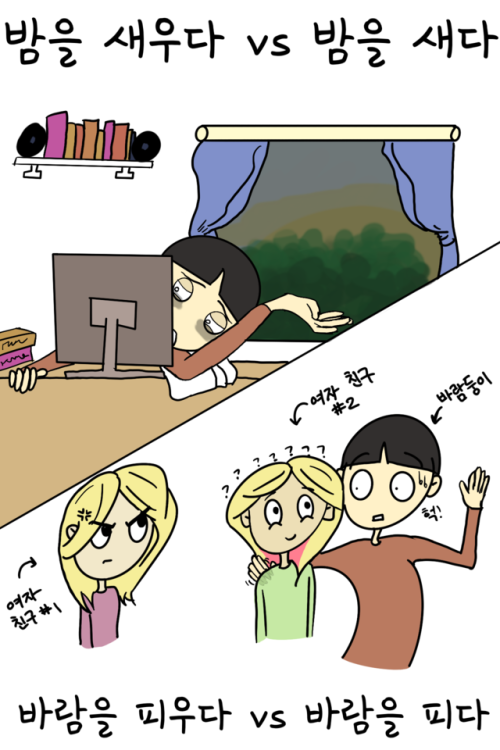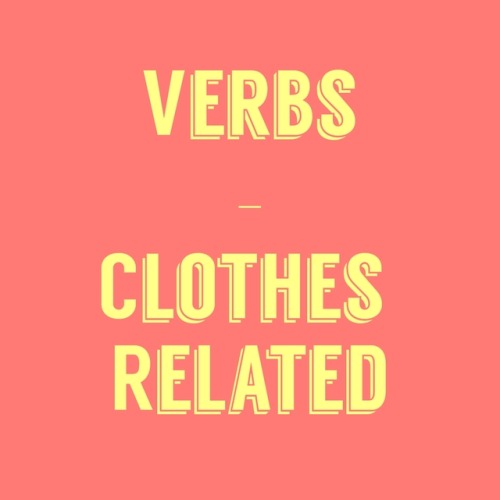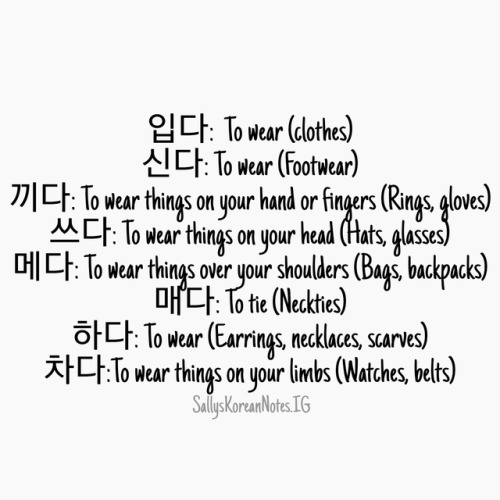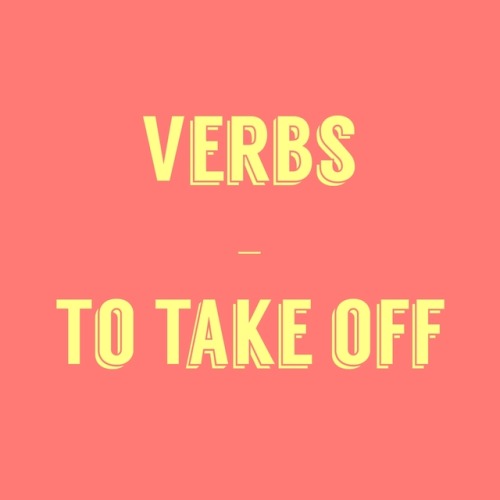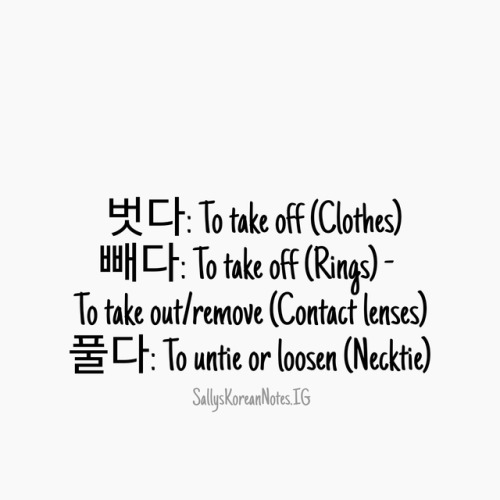#korean verbs
넣다 - to put in
서다- to stand; to stop
일어나다 - to get up
발견하다 - to discover
부르다 - to call (out)
내리다 - to come down
짓다- to make something; to build
필요하다 - to need
생기다 - to be formed
밝히다 - to brighten; to disclose
나가다-to leave; to go out
사용하다 - to use
들어오다- to enter; to come in
타다- to ride; to take (a car, bus, etc.)
닦다 - to wipe
다니다 - to attend
느끼다 - to feel
묻다 - to ask
남다 - to remain
떨어지다 - to fall
전하다 - to convey; to deliver
나누다 - to divide
이용하다 - to use
이루다 - to achieve; to form
떠나다- to leave
사라지다 - to disappear
얻다 - to gain
원하다 - to want
조사하다 - to investigate
치다 - to hit
인정하다- to admit; to acknowledge
돌아오다 - to return; to come back
파악하다 - to comprehend
제시하다 - to suggest
지키다 - to protect
발전하다 - to develop
알아보다- to recognize; to look into
오르다- to ascend
안다 - to hug
정확하다 - to be accurate
돌다 - to turn
쉬다 - to rest
바꾸다 - to change
지적하다 - to point out
노력하다 - to put in effort
정하다 - to decide
유지하다 - to maintain; to retain
늘어나다 - to stretch; to increase
피하다- to avoid
확인하다 - to confirm
“today’s korean”
hey yall~~
i’m planning on starting kind of a serie of posts with no specific subjects ; i’ll just be discussing random things i discover or learn such as words, expressions, grammar points etc.. when i feel like i have stuff to share with u and that could be useful!hope you’ll like it!^^
korean learning chat
hello everyone! i had some trouble w my kkt account so it removed me from the korean learning chat i created. i created a new one so please join this one instead of the old one ^^ thanks! https://open.kakao.com/o/g2oSB5Y
♥︎︎︎︎ random korean slangs/expressions pt.1
•뭐하고 지내요?
“what are you up to?”
it literally says “what are you doing and how are you?”
•까먹었어!
“i forgot!”
it’s an informal term for “잊어버리다” (to forget)
•씹다
“to ignore a text”
you may wanna use that verb when someone ignores your texts. “씹새끼” is a slang refering to people who ignore others people texts ; its rude so use that only when joking with your friends!
•친하게 지내요
“get along well”
you would use that when meeting someone for the first time and wish you can become friends/more friendly
•친추하다
“to add someone in your friend list”;“to become friends with someone (online)”
친추하자 = let’s add each other
친(친구) friend + 추(추가하다) add

how to : multiple verbs sentences in korean
helloooooo. so in this post i will be explaining you all how to use multiple verbs in the same sentence.
before learning this, make sure you already kinda master how to conjugate verbs in past, present and future tenses and also know how to use basic sentence structure:)
it will look like Verb stem+고+Verb
-고 is added to verbs you want to link together in order to form your sentence
a simple way to say “and” is using the word “그리고” :
“학교에 갔어요. 그리고 친구랑 만났어요.”
i went to school. and i met with friends.
but let’s say you want to say something like :
“i am studying and listening to music”
공부하고 음막을 들어요
- present tense:
먹다 = 먹-다 = 먹+하고 = 먹고 “eat and…”
말하다 = 말하다-다 = 말하+고 = 말하고 “talk and…”
보다 = 보다-다 = 보+고 = 보고 “see and…”
- past tense :
읽다 = 읽었다-다 = 읽었+고 = 읽었고 “read and…”
좋아하다 = 좋아했다-다 = 좋아했+고 = 좋아했고 “liked and…”
배우다 = 배웠다-다 = 배웠+고 = 배웠고 “learned and…”
- future tense :
노래하다 = 노래할 거+고 = 노래할 거고 “i will sing and…”
찍다 = 찍을 거+고 = 찍을 거고 “i will take a picture and…”
보다 = 볼 거+고 = 볼 거고 “i will see and…”
- more examples :
- “i cooked and ate”
요리했고 먹었어요
- “what are you up to?”
뭐하고 지내요?
“i’m doing well and working”
잘 지내고 일해요
- “i went shopping and watched a movie”
쇼핑하러 갔고 영화를 봤어요

i feel very bad about how i left this blog without no updates as it probably is helpful to many people. i dont have that much time to focus on it anymore but since im getting some free time this month i am thinking of working on it again. however, i am gonna ask you guys first if you want me to comeback active on this blog cause if ill be doing some work its only for you guys and if i dont get any interactions i dont think i will do it as it should help you guys and not me :) please reply to this post if you want this blog active again and let me know post ideas and what youd want me to help you with. thatd be v nice. tysm for still following this blog
오랜만~.~ long time no see
hello everyone! im finally on summer break~ i know i havent been active these past months and i apologize! i hope my posts i did till now could help u still^^ now that i have some free time, im posting this to ask if u guys would like me to comeback and post more like i did before? pls let me know :) thanks for ur follows and likes btw!! im happy people check my account even when im not active :D
asks open
hi feel free to ask me anything concerningkorean or anything else,i’ll do my best to answer and help!
have a good day, night ♥︎︎︎︎
Hey guys, today I have two interesting verbs for you.
새우다 and 피우다. The reason they are interesting is that you often don’t see them in their “correct” form while talking. Some of you might have even noticed this or wondered why you don’t see 새우다 and 피우다 often or if there is a difference.
In textbooks you’ll learn sentences like:
어제 밤을 새워서 공부했어요. I stayed up all night studying yesterday.
But, you don’t hear that sentence too often in real life conversations with friends. Instead, you hear this:
어제 밤을 새서 공부했어요. I stayed up all night studying.
Or
밤을 샜어요. I stayed up all night./I pulled an all-nighter.
In class, newspapers, and in the dictionary, you will (or should) find the verb as 새우다. But, most people (at least in Seoul) use the verb as 새다. 우 completely disappears. 피우다 is the same. In the dictionary and in your books, you’ll see 담배(를) 피우다 and 바람(을) 피우다. But, many people say 담배(를) 피다 and 바람(을) 피다.
밤을 새다 is technically incorrect. But, you’ll hear it more often than the correct version. It’s kind of like “who and whom” in the US. Most people don’t use “whom” at all. They use “who” incorrectly even if they know it’s wrong. That’s because for some weird reason using “who” wrong sounds more natural than using “whom” correctly.
Here are a few examples of the three most common words I’ve come across.
담배를 안 폈으면 좋겠어요. (*안 피웠으면) I wish you didn’t smoke cigarettes.
밤을 새지 마. 숙제는 내일 해. (*새우지 마) Don’t stay up all night. Do your homework tomorrow.
남자 친구가 바람을 피면 끝이야! (*바람을 피우면) If (my) boyfriend cheats, it’s over/it’s the end.
It’s strange that language sometimes sounds better when it’s wrong, right? Just one more reason to not stress about speaking “perfect Korean.” You should use the correct form when writing papers and on tests, but when you’re talking or texting, feel free to use it “incorrectly.”
Anyway, good luck studying guys!
Post link
♡ 시작하다 - to start
(시작해요, 시작했아요, 시작할 거에요…)♡ 끝나다 - to finish, end
( 끝나요, 끝났어요, 끝날 거에요…)♡ 살다 - to live
(살아요, 살았어요, 살 거에요…)♡ 죽다 - to die
(죽어요, 죽었어요, 죽을 거에요…)♡ 있다 - to have
(있어요, 있었어요, 있을 거에요…)♡ 없다 - to not have
(없어요, 없었어요, 없을 거에요…)♡ 먹다 - to eat
(먹어요, 먹었어요, 먹을 거에요…)♡ 마시다 - to drink
(미셔요, 마셨어요, 마실 거에요…)♡ 요리하다 - to cook
(요리해요, 요리했어요, 요리할 거에요…)♡ 만들다 - to make
(만들어요 만들었어요, 만들 거에요…)♡ 사용하다 - to use
(사용해요, 사용했어요, 사용할 거에요…)♡ 하다 - to do
(해요, 했어요, 할 거에요…)♡ 주다 - to give
(줘요, 줬어요, 줄 거에요…)♡ 가다 - to go
(가요, 갔어요, 갈 거에요…)♡ 오다 - to come
(와요, 왔어요, 올 거에요…)♡ 만나다 - to meet
( 만나요, 만났어요, 만날 거에요…)♡ 배우다 - to learn
(배워요, 배웠어요, 배울 거에요…)♡ 공부하다 - to study
(공부해요, 공부했어요, 공부할 거에요)♡ 가르치다 - to teach
(가르쳐요, 가르쳤어요, 가르칠 거에요…)♡ 읽다 - to read
(읽어요, 읽었어요, 읽을 거에요…)♡ 보다 - to watch/see
(봐요, 봤어요, 볼 거에요…)♡ 일하하다 - to work
(일해요, 일했어요, 일할 거에요…)♡ 운동하다 - to exercise
(운동해요, 운동했어요, 운동할 거에요…)♡ 쉬다 - to rest
(쉬여요, 쉬였어요, 쉬을 거에요…)♡ 일어나다 - to get up
(일어나요, 일어났어요, 일어날 거에요…)♡ 자다 - to sleep
(자요, 잤어요, 잘 거에요…)♡ 앉다 - to sit
(앉아요, 앉았어요, 앉을 거에요…)♡ 울다 - to cry
(울어요, 울었어요, 울을 거에요…)♡ 웃다 - to smile
(웃어요, 웃었어요, 웃을 거에요…)♡ 노래하다 - to sing
(노래해요, 노래했어요, 노래할 거에요….)♡ 춤 추다 - to dance
(춤 춰요, 춤 췄어요, 춤 출 거에요…)♡ 연습하다 - to practice
(연습해요, 연습했어요, 연습할 거에요…)♡ 놀다 - to play
(놀아요, 놀았어요, 놀을 거에요…)♡ 사다 - to buy
(사요, 샀어요, 슬 거에요…)♡ 주문하다 - to order
(주문해요, 주문했어요, 주문할 거에요…)♡ 팔다 - to sell
(팔아요, 팔았어요, 팔을 거에요…)♡ 내다 - to pay
(내요, 냈어요, 낼 거에요…)♡ 기다리다 - to wait
(기다려요, 기다렸어요, 기다릴 거에요…)♡ 찍다 - to take a picture
(찍어요, 찍었어요, 찍을 거에요…)♡ 알다: to know
(알아요, 알았어요…)♡ 모르다: to not know
(몰라요, 몰랐어요…)♡ 생각하다 - to think
(생각해요, 생각했어요, 생각할 거에요…)♡ 말하다 - to talk, speak
(말하요, 말핬어요, 말할 거에요…)♡ 전화하다 - to telephone
(전화해요, 전화했어요, 전화할 거에요…)♡ 얘기하다 - to talk, chat
(얘가해요, 얘가했어요, 얘기할 거에요…)♡ 채팅하다 - to chat on the internet
(채팅해요, 채팅했어요, 채팅할 거에요…)♡ 물어보다 - to ask
(물어봐요, 물어봤어요, 물어볼 거에요…)♡ 도와주다 - to help
(도와줘요, 도와줬어요, 도와줄 거에요…)♡ 필요하다 - to need
(필요해요, 필요했어요, 필요할 거에요…)♡ 타다 - to ride
(타요, 탔어요, 탈 거에요…)♡ 운정하다 - to drive
(운정해요, 운정했어요, 운정할 거에요…)♡ 태어나다 - to be born
(태어나요, 태어났어요, 태어날 거에요…)♡ 사랑하다 - to love
(사랑해요, 사랑했어요, 사랑할 거에요…)♡ 좋아하다 - to like
(좋아해요, 좋아했어요, 좋아할 거에요…)♡ 싫어하다 - to hate
(싫어해요, 싫어했어요, 싫어할 거에요…)♡ 보내다 - to send
(보내요, 보냈어요, 보낼 거에요…)♡ 받다 - to receive
(받아요, 받았어요, 받을 거에요…)♡ 공유하다 - to share
(공유해요, 공유했어요, 공유할 거에요…)
So many verbs relating to clothes ! Ah haha it seems intimidating but once you study them it gets easier! Good luck!:)
Follow@SallysKoreanNotes on Instagram for daily Korean notes and vocabulary!
Post link
있다 - 있어요: To exist, to have
없다 - 없어요: To not exist, to not have
Example:
책이 있어요.
There is a book.
책이 없어요.
There isn’t a book.
This type of sentence can have two subjects:
One naming the possessor of the object.
The other naming the object possessed.
Example:
내가 연필 이있어요.
I have a pencil.
However, it is more usual for the possessor to be expressed as a topic and the nouns possessed as a subject.
Example:
우리는 개가 없아요.
We don’t have a dog.
Info from Elementary Korean Second Edition
Weekly Verb
믿다 - To trust, To believe (in)
Conjugation:
믿었어요 - Past
믿어요 - Present
믿고 있어요 - Present progressive
믿을 거예요 - Future
참석하다 - To attend, To participate
실례하다 - To annoy, To trouble
기대하다 - To anticipate, To expect
감사하다 - To appreciate, To thank
가져오다 - To bring, To cause
결정되다- To be decided
나빠지다 - To become worse
데려오다 - To bring, To fetch
쓰이다 - To be used
안되다 - To be unsuccessful
끊어지다 - To be disconnected, To get cut
구성되다 - To be composed, To be formed
취하다 - To be drunk
피다 - To bloom, To blossom
막다 - To block, To stop, To prevent
자랑하다 - To boast, To show off
만족하다 - To be satisfied, To be content
발견되다 - To be discovered, To be found
관련되다 - To be related to
갈아입다 - To change (clothes)
거두다 - To collect, To achieve
건너다 - To cross over
걸어오다 - To come on foot
계속되다 - To continue, To be continued
고려하다 - To consider
고르다 - To choose, To select
내려오다 - To come down
알아보다 - To check, To investigate, To realize
확인하다 - To confirm, To check
개발하다 - To develop, To create
결정하다 - To decide
그리다 - To draw, To paint
그러다 - To do that, To do this
꿈꾸다 - To dream of
나누다 - To divide, To split, To share
줄어들다 - To decrease, To shrink
졸다 - To doze off
강조하다 - To emphasize
겪다 - To experience, To undergo
견디다 - To endure, To bear, To stand
달아나다 - To escape, To runaway
즐기다 - To enjoy, To have fun
터지다 - To explode, To break out
경험하다 - To experience
끝나다 - To end, To be over
노력하다 - To endeavor, To strive
따라가다 - To follow, To go after
날다 - To fly
쳐다보다- To gaze, To stare
어울리다 - To get along, To match, To suit
걸어가다 - To go on foot, To walk
낳다 - To give birth to
늙다 - To get old
다녀오다 - To go and get back
가지다 - To have, To possess
고생하다 - To have a hard time, To suffer
감추다 - To hide, To disguise
늘다 - To increase, To improve
무시하다 - To ignore, To neglect
구경하다 - To look around, To see the sights
남기다 - To leave behind
돌아보다 - To look back
둘러보다 - To look around
잃어버리다- To lose something
실수하다 - To make a mistake
벌다 - To make money, To earn money
뜻하다 - To mean, To indicate
끄덕이다 - To nod, To give a nod
관찰하다 - To observe, To watch
넘치다 - To overflow, To brim over
쌓다 - To pack, To stack, To accumulate
데리다 - To pick somebody up
갖추다 - To prepare, To be equipped with
진행되다 - To progress, To proceed
질문하다 - To question, To ask
기르다 - To raise, To grow, To develop
깨닫다 - To realize, To become aware
기록하다 - To record, To write
기뻐하다 - To rejoice, To be happy
기억하다 - To remember, To recall
닮다 - To resemble, To look like
요구하다 - To request, To demand
달려가다 - To run, To dash
그만두다 - To stop, To drop, To quit
그치다 - To stop, To cease
노래하다 - To sing a song
외치다 - To shout, To yell
해결하다 - To settle, To solve
나타내다 - To show, To express
아끼다 - To save, To cherish
내밀다 - To stick out, To stretch out
흔들다 - To shake, To swing
비추다 - To shine, To reflect
몰다 - To steer, To drive
돌보다 - To take care, To look after
가져가다 - To take, To carry
던지다- To throw
갈아타다 - To transfer, To change (car, train, etc…)
걸리다 - To take time
돌다 - To turn, To rotate
Let’s add them to the list
울다 - To cry
Conjugation:
울었어요 - Past
울어요 - Present
울고 있어요 - Present progressive
울 거예요 - Future
how to say i’m crying on the inside? someone, pls.
고 있다 is added to a verb to indicate that the action is still going on, kinda like adding “ing” to a verb . just remove the 다 from the end of the basic form of the verb and add 고 있다 For Example :
가다 = 가고 있어요
공부하다 = 공부하고 있어요
Example sentences
방용국이 웃고 있어요= Yongguk is smiling

문종업이 춤을 추고 있어요 = Jongup is dancing

정대현이 노래하고 있어요 Daehyun is singing

You can also use it in Past tense form too : ~고 있었어요 its like saying “I was doing____ in the past”
For example: = 나는 내 사업에 신경을 쓰고 있었어요. 그럼 내가 k-pop 을 찾았 어.
(I was minding my own business and then I found k-pop)
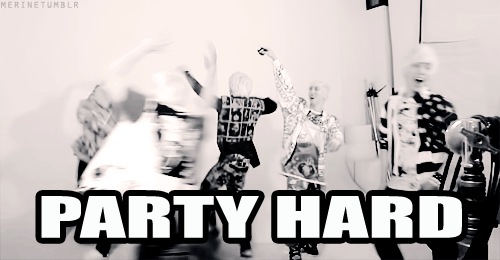
네요 is very simple its added to the end of a verb/adjective to show surprise.Just remove the last part of the verb/adjective and add 네요 For example =
하다 = 하네요
있다 = 있네요
Example sentences
와우 김남준가 한국인 있지만 영어를 정말 잘하네요! (Wow Namjoon is Korean but he speaks English really well!)

Woozi 가 짧지 만 인기 있네요! (Woozi is short but popular!)

대박! Got7은 곧 다시 돌아오고 있네요! (Aawesome! Got7 are coming back soon!)

(sorry for not posting in a long time, i’m super busy with school, i probably wont have another post till the summer, i may post some random Korean class stories or something but nothing big. if you guys want me to post anything specific just message me)

